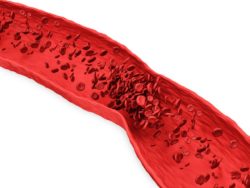 Although more prevalent after the age of 50 and certainly more common among people with certain habits and genetic dispositions, the proclivity of blood clots forming in the lower extremities of the legs is not limited to a select few. According to Healthline.com, those at risk for deep vein thrombosis include just about everyone and everyone should take preventative measures to avoid DVT.
Although more prevalent after the age of 50 and certainly more common among people with certain habits and genetic dispositions, the proclivity of blood clots forming in the lower extremities of the legs is not limited to a select few. According to Healthline.com, those at risk for deep vein thrombosis include just about everyone and everyone should take preventative measures to avoid DVT.
Why Would A Younger Adult Be Affected?
A younger adult might be affected by this condition because of pregnancy or recent delivery of a baby. While still not occurring often, pregnant women are at risk for deep vein thrombosis at a level five to ten times that of non-pregnant women. Oral contraceptive pills which younger adult females often take in an attempt to control their family size have also been found to put them at risk for deep vein thrombosis.
Other factors affecting a younger crowd would be tobacco use, obesity, and a sedentary lifestyle. Admittedly, the consequences for these lifestyle habits increase the longer they are in existence, so while a younger adult that is heavy, smokes, or sits for long periods can be affected by deep vein thrombosis, the problem is more likely to develop later in life.
Nevertheless, the more lifestyle complications that are present, combined with a family history in which one or both parents had problems with thrombotic events, can spell trouble.
Why Are Older Adults More Likely To Be Affected?
As previously indicated, the individual life habits such as overeating, smoking, and failing to exercise ramp up over time, wreaking havoc anatomically. As adults age, with or without these habits, people are more likely to develop problems with high blood pressure or need surgery for one reason or another. Both of these are precursory issues for thrombotic problems.
While the reason for hypertension leading to thrombosis is not clear, surgery is often followed by long periods of recovery in which a patient must be largely immobile. Optimum circulation–achieved through movement—is a preventive action with which people of all ages can engage.
How Does Xeljanz Affect Blood Clot Formation?
According to a Jul. 26, 2019 communication by the U.S. Food and Drug Administration (FDA), Xeljanz—known generically as Tofacitinib and approved for the treatment of rheumatoid arthritis, psoriatic arthritis, and ulcerative colitis—was slapped with a new high-level black box warning regarding dosage.
According to the FDA, the results of an ongoing clinical trial involving patients with rheumatoid arthritis in which dosages and effectiveness have been measured, higher doses used for ulcerative colitis amounting to a twice daily dose of 10 mg were linked to a higher risk of blood clots which move to the lungs.
The higher dose will only now be approved for patients who have exhausted other treatment modalities and have found them to not work.
Additional recommendations about keeping Xeljanz at lower doses were released by the European Medicines Agency in March 2019. The advice from this regulatory agency was to keep the dose of Xeljanz for patients with rheumatoid arthritis at 5 mg twice daily unless absolutely necessary.
What Is Dangerous About Deep Vein Thrombosis?
According to Healthline, deep vein thrombosis, or DVT, is dangerous because blood clots created in the deep veins of the leg can break off and move through the circulatory system to the heart and lungs. If this happens, the clot can contribute to sudden cardiac or respiratory arrest or become a factor in a debilitating stroke.
Join a Free Xeljanz Blood Clot Lawsuit Investigation
If you or someone close to you suffered a pulmonary embolism, deep vein thrombosis, or died after taking Xeljanz or Xeljanz XR, you may benefit from participating in a free Xeljanz blood clot lawsuit investigation. Learn more by filling out the short form on this page.
This article is not legal advice. It is presented
for informational purposes only.
ATTORNEY ADVERTISING
Top Class Actions is a Proud Member of the American Bar Association
LEGAL INFORMATION IS NOT LEGAL ADVICE
Top Class Actions Legal Statement
©2008 – 2025 Top Class Actions® LLC
Various Trademarks held by their respective owners
This website is not intended for viewing or usage by European Union citizens.
Get Help – It’s Free
Join a Free Xeljanz Blood Clot Lawsuit Investigation
If you qualify, an attorney will contact you to discuss the details of your potential case at no charge to you.
PLEASE NOTE: If you want to participate in this investigation, it is imperative that you reply to the law firm if they call or email you. Failing to do so may result in you not getting signed up as a client or getting you dropped as a client.
E-mail any problems with this form to:
[email protected].
Oops! We could not locate your form.












